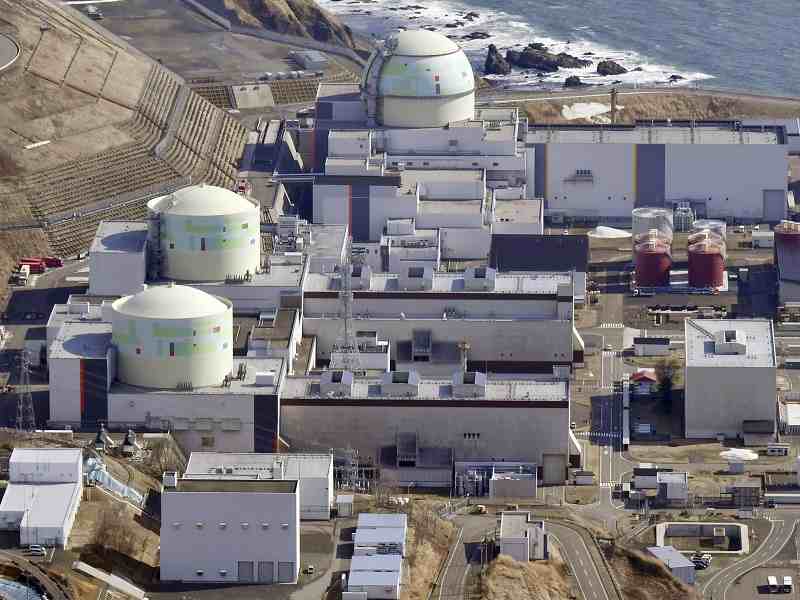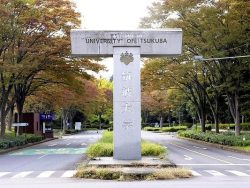
The Tomari nuclear power plant operated by Hokkaido Electric Power Co. is seen in March 2020.
11:15 JST, June 8, 2022
Despite calls from the Liberal Democratic Party and the business community to hasten the restart of nuclear power plants amid soaring energy prices and tight supply and demand, various circumstances have prevented it.
Power utilities have applied for safety inspections based on the new regulatory standards for 27 reactors at 16 power plants. Of them, 10 reactors at six nuclear power plants have been restarted after passing the Nuclear Regulation Authority’s examination. But for various reasons, seven reactors that have passed have not been able to resume operations. For the remaining 10 reactors, the examination process has been protracted and there is no prospect of resuming operations.
When an online meeting was held on May 20 to examine the No. 2 reactor of Hokuriku Electric Power Co.’s Shika nuclear plant, an official from the NRA’s Secretariat said, “We’d like you to show us detailed monitoring reports … We want to confirm the situation on site at some point.”
The examination to restart the No. 2 reactor at the Shika plant in Ishikawa Prefecture has already continued for nearly eight years due to a disagreement between Hokuriku Electric and the NRA over whether a fault under the site is active or not.
A nuclear reactor is not allowed to start operating again if there is an active fault directly under the reactor or other critical facilities. Hokuriku Electric submitted the results of drilling surveys conducted at about 270 locations and said that the possibility of an active fault could be ruled out.
However, no conclusion was reached on the day and the matter was carried over.
After the 2011 disaster at Fukushima No. 1 nuclear power plant of Tokyo Electric Power Company Holdings Inc., the new regulatory standards — which include a review of assumptions about earthquakes and strengthened countermeasures — came into effect in July 2013. Electric power companies have applied to the NRA for safety inspections based on the new regulatory standards for a total of 27 reactors, including two reactors under construction.
Of these, 17 reactors have passed the examination, meaning that they are in compliance with the standards, and 10 reactors from Kyushu Electric Power Co., Kansai Electric Power Co. and Shikoku Electric Power Co. have resumed operations.
Of the seven reactors that passed the examination but have not restarted, five have yet to install anti-terrorism facilities or complete construction for security countermeasures.
Ten reactors, including the No. 2 reactor of the Shika nuclear plant, have not passed due to a protracted examination process. Hokkaido Electric Power Co.’s No. 1, 2 and 3 reactors of the Tomari nuclear plant in Hokkaido have been under inspection for nearly nine years, since their application was submitted. Hokkaido Electric has been unable to provide data to prove that the faults at the site are not active.
Chubu Electric Power Co. is now considering strengthening its countermeasures for reactors No. 3 and 4 of the Hamaoka nuclear plant in Shizuoka Prefecture, as a revision of tsunami assumptions has raised the possibility that they could be hit by a higher tsunami.
At TEPCO’s Kashiwazaki-Kariwa nuclear plant in Niigata Prefecture, anti-terrorism deficiencies have been uncovered, including the problem of an employee illegally entering the central control room with someone else’s ID card, prompting the NRA to issue a de facto order to suspend operations.
Proposals call for efficiency
Under these circumstances, the LDP and business communities are calling for the reactors that have been shut down to resume.
The LDP’s special committee on nuclear regulation compiled a proposal urging the NRA to improve the efficiency of its review process and handed it to Prime Minister Fumio Kishida on May 16, stating that “society strongly demands that those plants that can operate be put back into operation as soon as possible.”
Following power shortages caused by the earthquake that shut down thermal power plants and other factors, Japan Business Federation (Keidanren) Chairman Masakazu Tokura called in March for nuclear plants for which safety has been assured to resume operation swiftly.
In response, NRA Chairman Toyoshi Fuketa said at a press conference on May 18: “We cannot allow any compromise on safety. We can never neglect the confirmation of safety by hurrying.”
“It takes a long time to examine how to respond to natural disasters such as earthquakes and tsunamis, because investigations and analysis are required for each nuclear power plant location and site,” said Tetsuo Sawada, former associate professor at the Tokyo Institute of Technology who specializes in nuclear engineering.
There are many cases where power companies submit materials that are different from those requested by the NRA and have to submit them again at the examination meetings. Deepening dialogue between the two parties and resolving the lack of communication will speed up the review process. Human resource development is also an issue, given there are shortages of experts at power companies and delays in data analysis and evaluation.
The Secretariat of the Nuclear Regulation Authority is also understaffed. When it was established in September 2012, it had just 473 staff members, and this number has increased to approximately 1,000 since it was merged with the Japan Nuclear Energy Safety Organization in 2014. Still, that is far less than the U.S. Nuclear Regulatory Commission (NRC), which has approximately 4,000 staff.
“We will make as much effort as possible to enhance the efficiency of the examination process, which is good for the regulators as well,” Fuketa said.
It is hoped that the NRA and the electric power companies will pool their wisdom and work together to speed up the review process.
Top Articles in Science & Nature
JN ACCESS RANKING
-

Japan Institute to Use Domestic Commercial Optical Lattice Clock to Set Japan Standard Time
-

Israeli Ambassador to Japan Speaks about Japan’s Role in the Reconstruction of Gaza
-

Man Infected with Measles May Have Come in Contact with Many People in Tokyo, Went to Store, Restaurant Around When Symptoms Emerged
-

Prudential Life Insurance Plans to Fully Compensate for Damages Caused by Fraudulent Actions Without Waiting for Third-Party Committee Review
-

Woman with Measles Visited Hospital in Tokyo Multiple Times Before Being Diagnosed with Disease

























